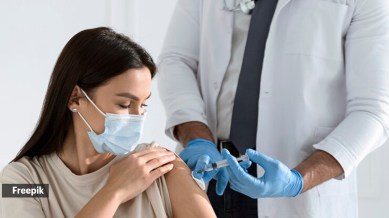📣 For more lifestyle news, click here to join our WhatsApp Channel and also follow us on Instagram
Can a getting a preventive vaccination against pneumonia reduce risk of viral infections like HMPV?
HMPV causes flu or cold-like symptoms, including fever, cough, and nasal congestion. It often resolves independently but can cause lower respiratory tract infections among children, older adults, and those immunocompromised.

Amid heightened surveillance in India for HMPV or human metapneumovirus infections, we asked experts whether getting a pneumonia vaccine is essential to safeguard against such respiratory viruses.
HMPV causes flu or cold-like symptoms, including fever, cough, and nasal congestion. It often resolves independently but can cause lower respiratory tract infections among children, older adults, and those immunocompromised.
monthly limit of free stories.
with an Express account.
A PTI report quoted experts saying that HMPV is unlike Covid-19 in that it has been around for decades, and there is some built-in immunity to it. It stated that most children are infected with the virus by the age of 5.
Dr Amit P Ghawade, consultant pediatrician and neonatologist, Motherhood Hospitals, Kharghar described that pneumonia is a type of infection that negatively affects your lungs making it difficult to breathe.
People and kids with weakened immune systems such as young children, and older adults, and chronic health issues like asthma or diabetes should be cautious and get vaccinated as they are at a higher risk of pneumonia, said Dr Ghawade.
Dr Ravi Shekhar Jha, pulmonologist, director pulmonology, MD, MRCP, Fortis Hospital, Faridabad, said preventive vaccination against pneumonia is a critical tool in safeguarding public health, particularly as respiratory infections like human metapneumovirus (HMPV) gain attention. “Pneumonia, a potentially life-threatening infection, disproportionately affects vulnerable groups such as older adults, people with chronic diseases, and those with weakened immune systems. Vaccination significantly reduces the risk of severe illness, hospitalisations, and fatalities caused by pneumonia,” said Dr Jha.
Pneumonia vaccines protect against Streptococcus pneumoniae, a leading cause of bacterial pneumonia. Dr Jha elaborated that two primary vaccines are available: the pneumococcal conjugate vaccine (PCV) and the pneumococcal polysaccharide vaccine (PPSV). “The PCV vaccine is commonly recommended for children under two, older adults, and individuals at high risk of infection. PPSV is primarily administered to adults over 65 and people with certain underlying conditions. Depending on health status and age, some individuals may require both vaccines, given in a specific sequence,” said Dr Jha.
For individuals aged 60 and above, a weakened immune system and age-related vulnerabilities make them more susceptible to pneumonia, stressed Dr Srinivasa Chary A, consultant general medicine, Gleneagles Aware Hospital, LB Nagar, Hyderabad. “A pneumonia conjugate vaccine administered once in a lifetime significantly reduces the likelihood of invasive pneumococcal diseases, hospitalizations, and mortality. Additionally, annual flu shots are recommended as influenza can act as a trigger for secondary bacterial pneumonia, compounding the risk,” said Dr Chary.
Dr Jha asserted that while pneumonia vaccines “do not directly prevent viral infections like HMPV”, they play a crucial role in reducing complications such as secondary bacterial pneumonia, which can occur after viral infections. “With the recent rise in HMPV cases, the importance of vaccination as a preventive measure has become even more apparent,” said Dr Jha.
What to consider?
Healthcare professionals are at heightened risk of exposure to infectious agents and play a pivotal role in preventing the spread of disease. “By staying up-to-date on vaccinations, including pneumonia and flu vaccines, they not only protect themselves but also minimize the risk of transmitting infections to patients, particularly those with compromised immunity,” said Dr Chary.
“Preventive vaccination is a cornerstone of proactive healthcare. It is a simple yet highly effective measure to enhance individual and public health outcomes, saving lives and reducing the burden on healthcare systems,” said Dr Chary.
However, getting vaccinated is not a one-size-fits-all approach. According to Dr Jha, recommendations vary based on age, health conditions, and individual risk factors. “Children typically receive PCV as part of their routine immunisations, while older adults and those with chronic illnesses might require a different vaccination schedule. It’s essential to consult with a healthcare provider to determine the most appropriate vaccine and timing,” said Dr Jha.
DISCLAIMER: This article is based on information from the public domain and/or the experts we spoke to. Always consult your health practitioner before starting any routine.
📣 For more lifestyle news, click here to join our WhatsApp Channel and also follow us on Instagram